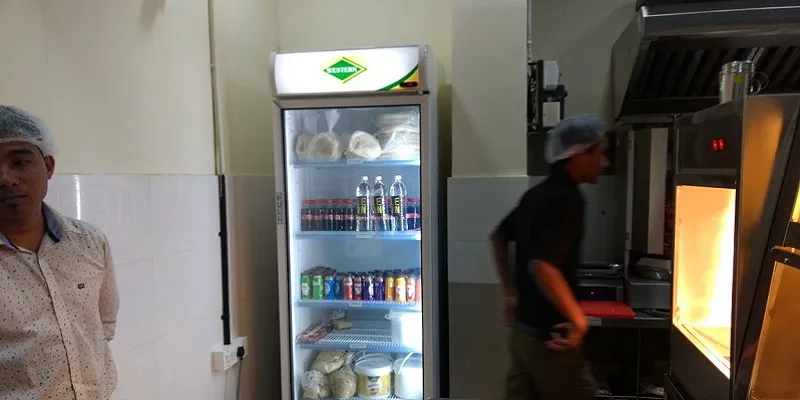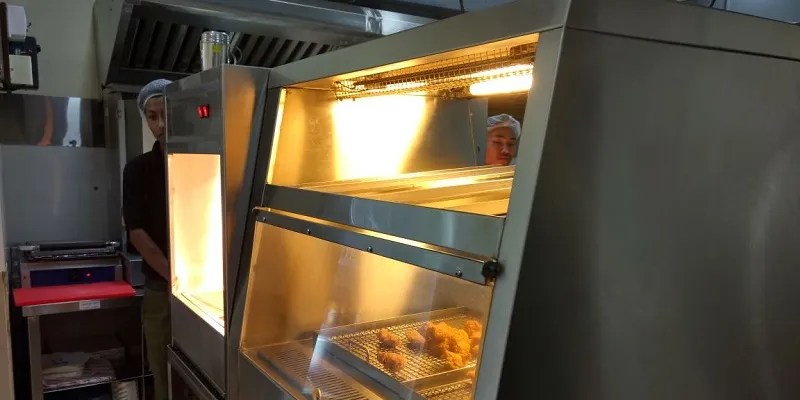Swiggy launches Swiggy Access, a central kitchen base-like facility for restaurants
Swiggy announced the launch of Swiggy Access, its first kitchen backend facility at Marathahalli, Bengaluru. Acting as a central base, Swiggy Access will house five kitchens of different restaurants.
Six months after it got Series E funding, Swiggy today announced the launch of Swiggy Access, a central base or warehouse facility housing five restaurants – Leon Grill, Keventers, Punjabi Rasoi, and two of Swiggy’s private labels, The Bowl Company and House of Dabbas - at Marathahalli.
The Bowl Company was launched in Koramangala early this year, and the House of Dabbas came a few months later.
Now, standing inside Leon Grill's kitchenette, Swiggy Co-founder and CEO Sriharsha Majety, who is popularly known as Harsha, said the idea of Swiggy Access came with an understanding of the consumers' needs and requirements.

A plug and play access
Spread across 3,200 sq ft, Swiggy Access comes fully-equipped with kitchen spaces and gives restaurant partners access to the Bengaluru-based food delivery startup’s delivery fleet. Addressing the Press, Harsha said the launch of Swiggy Access works as a strategic initiative for the company.
“Each restaurant has its own different personality. Hence, the kitchen space works according to the different needs and requirements of the restaurants,” said Harsha. Choosing a restaurant to be part of Swiggy Access depends on several parameters.
The kitchens work on a plug-and-play model where restaurants bring in their own equipment and need to simply start rolling out operations. While the Swiggy team refused to share the exact commission sharing, Harsha said the commissions were higher than in the marketplace model.
This is also because of the fact that restaurants do not pay rental and will get free access to advertising on the Swiggy platform. The restaurant partners will also be able to leverage Swiggy’s data insights and consumer feedback.
The Swiggy team added it will also help restaurants optimise the kitchen space at Swiggy Access with details like stock planning, demand forecasting, preparation time, and order edits.

Looking at high traffic and low access points
“We are looking at hungry entrepreneurs who aren’t content with opening one or two kitchens, but grow with possibly the next five,” said Harsha.
He added the company had considered areas with high consumer traffic and based on certain data science algorithms, the team worked on the cuisine mix that would work for the consumer base. Based on that, the team goes after areas where there is demand but supply is low.
“The other ways that we decipher this is when consumers search for a certain brand on the platform and it brings a null or a zero search. In that way, Leon Grill in Marathahalli comes with the top null-search result,” added Harsha.
Over the next few weeks, the team plans to launch the next Swiggy Access at Bellandur. There are three to four other areas that the team is looking at. In the next six months, Swiggy is looking to tie up with 40 restaurants across three metro cities. Bengaluru being the first, the team is yet to decide on the other two cities.

Suresh Kumar N, Founder Leon Grill, added,
“Tying up with Swiggy Access gives us the opportunity to reach out to a larger and newer audience base at lesser costs. The capital invested by us is minimal, and the support we get is higher."
Becoming a utilitarian app
With Swiggy Access, the delivery time will reduce by five minutes. Currently, the average time taken for delivery is between 30 and 35 minutes. The team believes that in the long run, it will be able to shave off the delivery time by a lot more as it will bring the assortment closer to the consumer.
Harsha said that in the last three years, Swiggy has been able to transform the way India eats. He explained,
“When we started Swiggy, we were looking at food delivery to consumers when they need a change and shift. We didn’t think it would become a utilitarian product. In India, we have jumped directly from home food to ordering via the app. Swiggy is leveraging the understanding of the Indian consumer and the gaps in the market and thus introducing disruptive and highly differentiated service offerings; making online food ordering and delivery more seamless and reliable to users everywhere.”
Surviving a bloodbath
In the past three years, Swiggy has acquired a delivery fleet size of over 20,000. This, the team believes, has given it an edge over competitors. Last month, Swiggy launched Swiggy Capital Assist in partnership with Indifi Technologies. The programme will give collateral-free loans to restaurant partners. The rate of interest and other details remain undisclosed.
Swiggy survived the 2016 foodtech bloodbath. The team claims it serviced four million delivery orders in July and said it has seen healthy growth since then. Post its funding, the Bengaluru-based food delivery startup said it was looking to double its headcount, increase investments in core engineering, automation, data sciences, Machine Learning, and personalisation.
This year so far, $300 million was invested in the foodtech sector and the overall food market in India is believed to be worth $193 billion, crossing $540 billion in the next three years.
Zomato, Swiggy, Freshmenu, Foodpanda, Faasos, and Innerchef are among the few startups that have managed to carve out a market for themselves. Currently, Zomato takes zero commissions from restaurants, and along with uberEats is seen as Swiggy’s competitor. With strong players in the foodtech space, Swiggy is looking at different avenues to differentiate itself.







